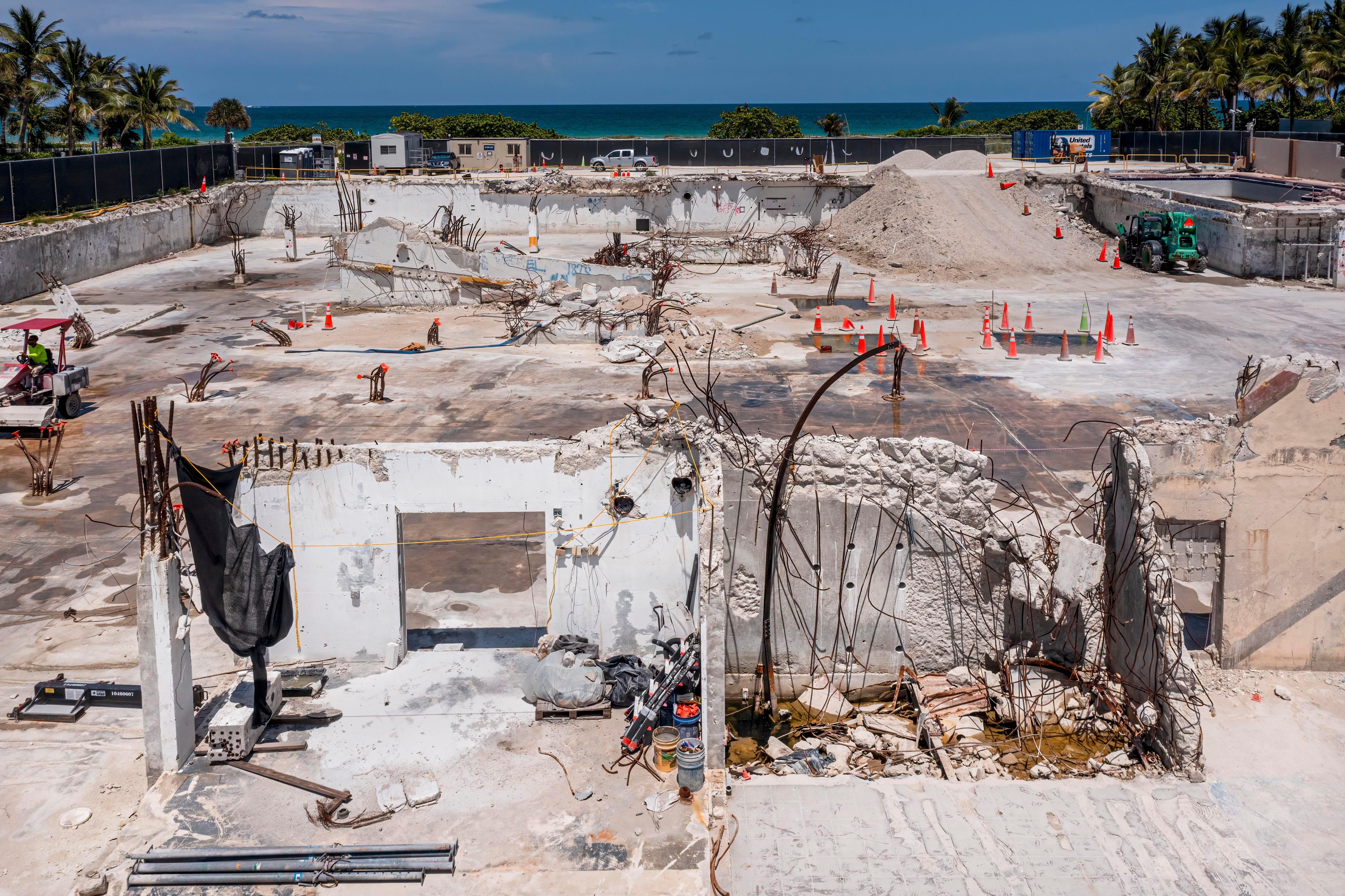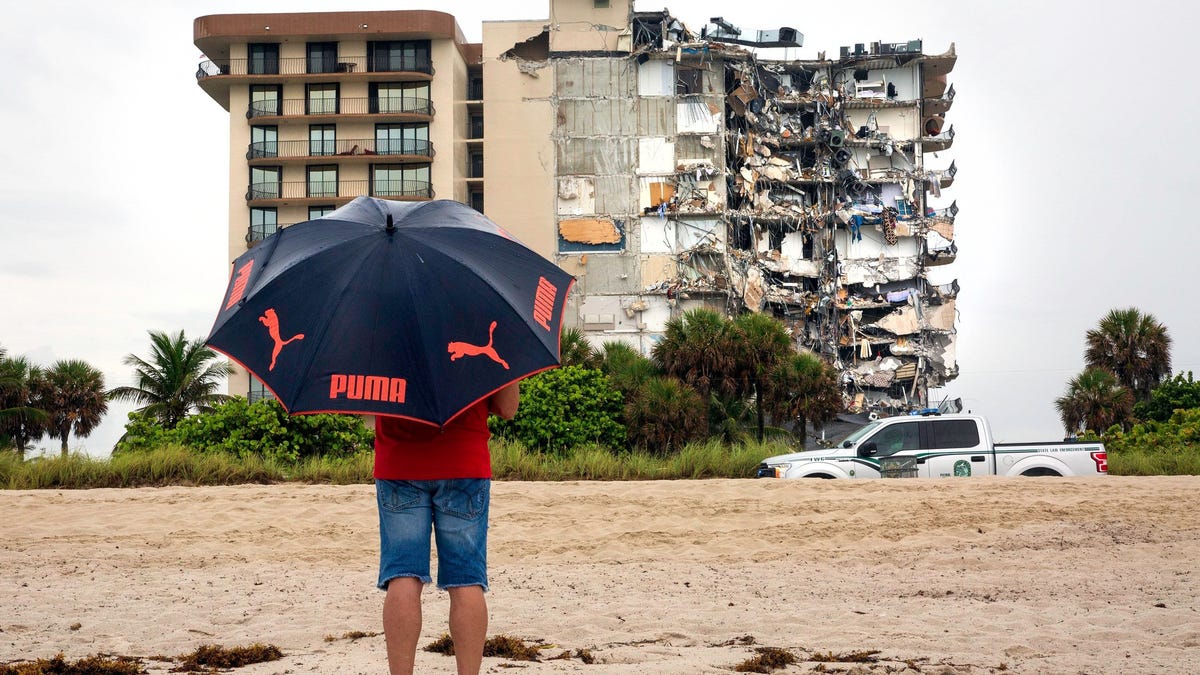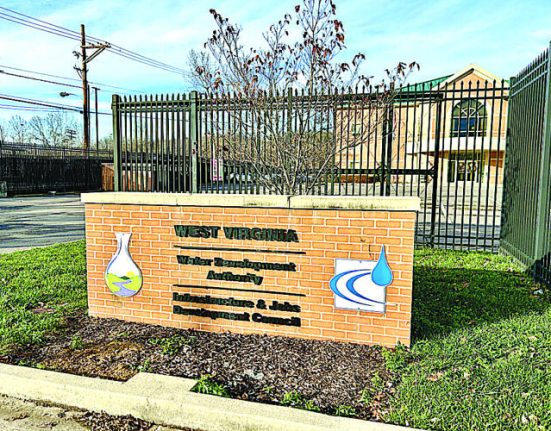The confidential list of no-go condominiums in Florida has surged to 1,438. In May 2023, just 35 Palm Beach County buildings were on the list.

Drone video of Florida condo collapse site in Surfside one year later
A condo in Surfside, Florida collapsed on June 24, 2021, ninety-eight people died. This drone video shows the condo collapse site one year later.
Greg Lovett, Palm Beach Post
- The blacklist impacts potential buyers’ ability to secure loans and building associations’ ability to borrow for repairs.
- The list’s expansion is attributed to the 2021 Surfside condo collapse and subsequent legislation requiring stricter building inspections and reserve funds.
- Realtors and attorneys report challenges navigating the blacklist and related lending requirements, including last-minute down payment increases and canceled closings.
A blacklist of Palm Beach County condominiums ineligible for Fannie Mae-backed mortgages has more than tripled over the past two years, making it more difficult for potential buyers to get loans and buildings to borrow money to make fixes, according to a Miami law firm specializing in condo law.
Attorney Jake Marcus, a managing partner in the Miami office of Allcock Marcus, said his firm began getting the confidential list of no-go condominiums in 2023 and saw a surge in numbers last month when the total for Florida hit 1,438.
South Florida’s three southeast counties top the list for the most blacklisted buildings with Miami-Dade ranked first at 344, followed by Broward’s 242 and Palm Beach County’s 110. In May 2023, just 35 Palm Beach County buildings were on the list.
Marcus said the firm is not releasing the entire list, but that people can fill out a form to find out if their building is on it at the website amcondolaw.com.
Fannie Mae did not respond to a request for comment for this story.
The impetus for the ballooning list was the 2021 collapse of the Champlain Towers South condominium in Surfside that killed 98 people, Marcus said.
“The problem is people don’t know about the blacklist until they find out they’re on it,” Marcus said. “The issue is, the buyer goes in, or the association goes in to get a loan, and they can’t secure it and don’t always know why.”
Fannie Mae doesn’t directly loan money. Instead, it buys up mortgages from lenders to package into mortgage-backed securities that are sold to investors. That frees up lenders to approve more mortgages.
Realtor Katherine Burgos Valdez with Echo Fine Properties in Palm Beach Gardens said she stumbled upon the blacklist when helping a client buy a condominium in Broward. She said the night before her client was scheduled to close, the lender said she needed to come up with another $12,000 for a down payment. She couldn’t, and the closing was canceled.
“We found a couple places and when we got to the lender side, they kept saying no, and I kept hearing about a list, and I was like, what is this list?” Burgos Valdez said. “The second lender, he reached out to Fannie Mae and said, ‘You are throwing these loans back for no reason, no explanation.’”
Burgos Valdez said the second lender showed her a list that had condominiums marked depending on whether they had full reserve funding, a partial reserve or just “no.” The amount of down payment needed relied, at least partly, on the ranking, she said.
After the high-rise collapse in Surfside, lawmakers passed legislation aimed at ensuring condominiums are safe. State law now requires that residential buildings 30 years or older and with three or more stories get an initial milestone inspection and have adequate reserves set aside to pay for fixes. That can mean hefty special assessments on owners or an attempt by the association board to get a loan.
“The boards are in a catch-22. If they are already on the list for having a construction defect, then they can’t get a loan to fix the defect,” Marcus said.
In the past few years, the so-called “1076” form, or Condominium Project Questionnaire, that looks at the eligibility of a condo for a loan has increased from five pages to eight, Marcus said. The additional pages ask about structural integrity and reserve requirements.
But insurance is also an issue, said Nick Gonzalez, a founding agent with Serhant in Delray Beach. He said three days before a client was scheduled to close on a condominium, the condo board changed the insurance policy to reduce association fees.
“When they made that change, it didn’t meet any mortgage company regulations, so the deal never closed,” Gonzalez said.
He’s seeing more interest in new townhomes from buyers who want something in between the bureaucracy of a large condominium and the daily burdens of a single-family home. A six-townhome project he’s representing in Delray Beach called Sirene Villas is half sold out with prices ranging between $5.5 million and $6 million.
“We go on listing appointments and everyone who is selling a condo is not buying another condo,” Gonzalez said.
That’s somewhat reflected in recent condominium sales as reported by the Broward, Palm Beaches, and St. Lucie Realtors Group. Although the group does not separate townhomes from condominiums, the two types of housing stock combined had a 10 months’ supply available for purchase in Palm Beach County in February.
That’s deep in the territory of a buyer’s market. A 5.5 to 6 months’ supply is generally considered a balanced market by Realtors where neither the buyer or seller have the upper hand.
Michael Gelfand, a West Palm Beach attorney who specializes in real estate and association law, said he hasn’t heard of the Fannie Mae blacklist but can attest to the importance of the condominium questionnaire. He’s fielded angry calls from real estate agents upset that some condominium buildings aren’t passing muster on the form.
“When the factual information does not qualify the community because it hasn’t kept reserves and hasn’t done the work, they want the information to change overnight,” said Gelfand, noting that another key question for lenders is how many units are owner-occupied.
Gelfand said the new rules and current costs to comply with them will be a bump in the road for many unit owners, however, some people will undoubtedly be unable to pay for expensive repairs.
Burgos Valdez ultimately helped secure a loan for her client in Broward County after a mortgage broker pressed Fannie Mae on why the condo building wasn’t approved for lending. Burgos Valdez said although the building had passed the appropriate inspection, it hadn’t been updated in Fannie Mae records.
“There were a lot of properties for sale in this building that were sitting and several closed after mine,” she said. “When we finally closed there were so many tears of joy.”
Kimberly Miller is a journalist for The Palm Beach Post, part of the USA Today Network of Florida. She covers real estate, weather, and the environment. Subscribe to The Dirt for a weekly real estate roundup. If you have news tips, please send them to kmiller@pbpost.com. Help support our local journalism, subscribe today.







